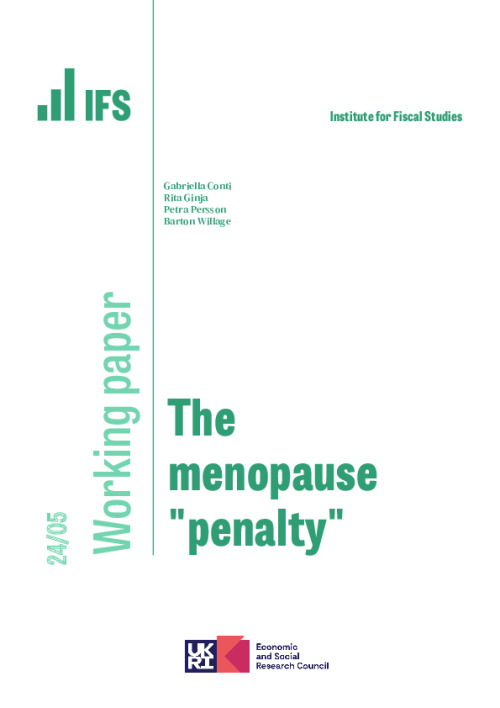Downloads

Download working paper PDF
PDF | 2.2 MB
Menopause is a major biological shock to women, marking the end of their reproductive years. Despite its relevance, scant research has studied how menopause impacts social dynamics, labor market outcomes, or health care demand. Using high-quality linked national register administrative data from Norway and Sweden, combined with a stacked difference-in-differences design, we estimate the effect of menopause diagnosis on employment and earnings, reliance on social safety net programs, and demand for medical care. We find that menopause affects a broad swath of women’s lives, ranging from a temporary increase in visits to doctors, to a persistent decline in full-time employment and earnings, and an increased receipt of social transfers. The earnings losses amount to 20% relative to the pre-menopause levels. Our results suggest that policies aimed at supporting women who suffer more serious symptoms around the menopausal transition may have wide-ranging benefits.
Authors

Research Fellow University College London
Gabriella is a Research Fellow of the IFS and a Professor of Economics in the Department of Economics and in the Department of Social Science at UCL.

Research Associate University of Bergen
Rita is an IFS Research Associate, an Associate Professor at the University of Bergen and a Research Associate at the Uppsala University.
Assistant Professor Stanford University
Assistant Professor University of Colorado - Denver
Working Paper details
- DOI
- 10.1920/wp.ifs.2024.0524
- Publisher
- Institute for Fiscal Studies
Suggested citation
Conti, G et al. (2024). The menopause "penalty". 24/05. London: Institute for Fiscal Studies. Available at: https://ifs.org.uk/publications/menopause-penalty (accessed: 30 June 2024).
More from IFS
Understand this issue

If you can’t see it, you can’t be it: role models influence female junior doctors’ choice of medical specialty
24 April 2024

Election Special: The UK economy since 2008
3 June 2024

What is the two-child limit in benefits?
27 June 2024
Policy analysis

How do the last five years measure up on levelling up?
19 June 2024

What are the parties’ plans for benefits and taxes?
24 June 2024

The two-child limit: poverty, incentives and cost
17 June 2024
Academic research

The impact of labour demand shocks when occupational labour supplies are heterogeneous
28 June 2024

The role of hospital networks in individual mortality
13 May 2024

Income inequality in Ireland, 1987–2019
28 June 2024